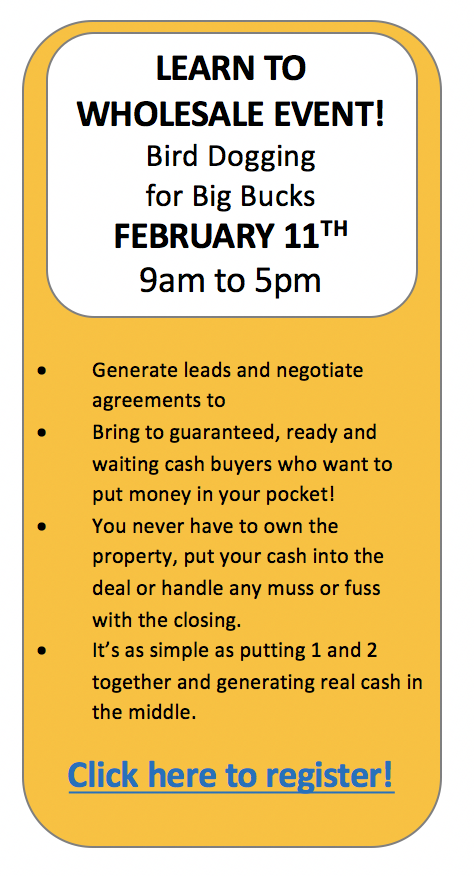Every investor should have one or more ways to sell properties quickly. Entering into a real estate transaction without knowing your exit strategy can be hazardous to your financial health. It can be painful, frustrating and downright costly.
What will you do?
Do you plan to flip the property to another investor? Are you going to fix it up and sell it retail? Maybe you plan to do a lease option. Before determining your best exit strategy you need to consider things like; how much money you are going to put into the property? How long do you expect to hold it? How long do you think it will take to sell? How long might it take your buyer to get financed? These are important questions you need to consider before you enter an agreement to purchase a property.
 When starting out, many new investors sell their first few deals to other investors in order to build up their capital reserves. If you learn to buy right, you can expect to make $1,000 to $5,000 per deal by simply assigning your contracts on your first deal or two. You do not have to own a property to make money from it.
When starting out, many new investors sell their first few deals to other investors in order to build up their capital reserves. If you learn to buy right, you can expect to make $1,000 to $5,000 per deal by simply assigning your contracts on your first deal or two. You do not have to own a property to make money from it.
All you need to do is control the property by putting it under contract. Once you’ve located a prospective deal and secured it with a purchase agreement, you can sell it to another investor for a profit.
Bargains for bargain hunters
Example: You find a property worth about $100,000 in its current state. It requires $10,000 to renovate the property. The After Repaired Value (ARV) of the property is $120,000. You negotiate a purchase price of $75,000 and sign a purchase agreement with the seller. Next, you find another investor who is willing to pay $77,500 for the property and do the necessary repairs. This allows you to sell your deal to another investor for $2,500 and walk away with a nice profit using no money of your own. The other investor will make a nice profit as well.
In this example, the property was purchased at a 25 percent discount from its current market value and a 37% discount from its ARV. Discounts can vary widely, based on things like the neighborhood, schools, access to transportation, shopping, as well as, the level of renovation the property needs.
Your buyer will likely be a rehabber who will renovate and retail the property. Be aware, that when they sell the property they will make more money than you will on the deal. Effectively when you wholesale, or flip, contracts your buyer takes on more risk and earns a greater reward. Do not let his bother you. There is margin enough for you both to profit.
Finding Buyers

One good place to find buyers for your properties or contracts can be your local investment club or association. You’ll meet other investors including wholesalers, rehabbers, landlords, agents, brokers and lots of other people involved in the property investment business.
You can find a list of local investment clubs and associations from around nation at www.NationalREIA.com. You can also find local groups by Googling “real estate investment clubs” or checking out local Meetup Groups. As you begin to network you can begin building your buyers list. This way every time you put a property under contract you can quickly and easily send out an email to your entire list.
Another way to build your buyers list is by using classified ads both online and offline. Offline ads will cost money you might not have whereas there are plenty of free online alternatives such as www.Craigslist.com.
Bandit signs are another great way to attract rehabbers, landlords and other investors (be sure to know your local laws regarding bandit signs). As you build your list you need to learn and keep track of what each of your buyers is looking for so you can quickly and easily match buyers and properties. Don’t spend too much time with inexperienced investors because many aren’t able to perform quickly.
Prescreenng and qualifying
Here are a few tips on qualifying your callers:
- How many houses do you buy each year?
- What type of discount do you usually look for on properties?
- Do you have your own cash to close or will you borrow it?
- How big a renovation can you handle?
- Paint and Carpet (Level 1)
- Replacing kitchens and baths (Level 2)
- Moving walls, Re-pipes, Rewires (Level 3)
- Sinkhole houses, Burnouts, Re-engineering (Level 4)
- If I find a bargain, how quickly can you close?
When you prescreen investor/buyers using these questions, you will quickly have a list of qualified investors to contact when a new project comes along. If you don’t have an investor association in your area, check out groups on social media sites like Facebook or Linked-In. There are lots of groups, check out Transaction Engineering Full Time on Facebook.
Retailing to the masses
 Many new investors try to retail properties to owner occupants without a real estate agent to in order to save money on commissions. While this may sound like a good idea, it usually isn’t. Besides trying to avoid paying a commission, they usually neglect to account for the cost of an agent’s commission in their estimate of sales expenses for the resale of the property.
Many new investors try to retail properties to owner occupants without a real estate agent to in order to save money on commissions. While this may sound like a good idea, it usually isn’t. Besides trying to avoid paying a commission, they usually neglect to account for the cost of an agent’s commission in their estimate of sales expenses for the resale of the property.
The primary benefit of using a real estate agent is to have your property listed in the Multiple Listing Service (MLS), which is used by all other real estate agents. The MLS will give your property visibility to the largest segment of the home buying public. This will allow you to focus your efforts on finding more deals rather than waiting for buyers to show up at your property. But in most markets commissions can run 6 or 7%.
In today’s market there are alternatives to the MLS; free online resources like, Zillow.com, Redfin.com, Trulia.com and my favorite is Postlets.com because it will automatically add your properties to the other property portals including Zillow and Trulia. It also allows you to print very professional looking flyers complete with property description and pictures.
If you want to sell fast, you may need to pull out all the stops and MLS is still the big man on campus. The more cost effective way to use the MLS is with a flat fee listing. There are brokers/agents out there who will list your property for a flat fee ranging from as little as $99.00 to $500. You will still have to pay a commission to the selling agent should there be one, but if you find your own buyer, no commission is due.
We use one locally that charges the members of our REIA $225 and as part of the service they add the property to Postlets.com and a number of other selling websites as part of their flat fee service. They will even help you figure out the paper work when you’re just starting out. This exposes our properties to the entire agent community as well as people who may be shopping but don’t have access to the MLS.
Since the listing agent/broker is only getting small flat fee, you will receive all the phone calls but there is an electronic lockbox on the property and you don’t have to waste your time showing the property. Instead you can be out there making more deals.
What if it doesn’t sell fast?
Not every property can be resold quickly. Occasionally, you may be stuck with a property for a few months. If you are disciplined and always do your homework, this will rarely happen. If you can’t resell a property within 30 days, you probably made a mistake somewhere in your process. Either you paid too much, bought in the wrong neighborhood or underestimated the renovation costs.
Other times you might be over-motivated and sign a purchase agreement on a marginal deal and have a difficulty reselling it. Even though you are looking for quick cash, there may be other ways to earn a profit. One strategy might be to take a promissory note from your investor/buyer for part or the entire purchase price (have an experienced real estate attorney or a knowledgeable closing specialist help guide you through this process).
The promissory note will be secured by lien against the property. This will be accomplished by recording either a mortgage or deed of trust depending upon which is customary in your state. The promissory note will contain interest, payment amounts and other terms.
Or you might even be willing accept a promissory note for the purchase price, with no payments due until the investor resells the property. We have actually purchased a lot of properties this way. A word of caution – before doing this you should confirm that the buyer has the financial resources and experience to renovate the property.
A third option can be to partner with the rehabber, which can work especially well when there are extensive repairs or a thin margin. If you are flipping to an investor who will rehab the property, you might offer the property as your share of the partnership while he offers the materials and the labor as his share. When you sell the property, you can split the proceeds. You may have to take less than half of the net profit to make the deal work. But a wise investor once said, “Half a paycheck spends a whole lot better than no paycheck!”
Whether it is flipping a contract or closing and reselling, the key is to know our way out of every transaction! Why do you think there are so many clearly marked exits in life? Safety friends, safety! Be sure your deals have clearly marked exits too!
You can learn how to Wholesale properties on February 11th at Bird Dogging for Big Bucks! You’ll be on the path to mastering the simple steps to entering the real estate game and playing to win! The best part is that you’ll be doing it in a way that won’t make you risk losing money or your future.
You will learn how to generate leads and negotiate agreements to bring to guaranteed, ready and waiting cash buyers who want to put money in your pocket! You never have to own the property, put your cash into the deal or handle any muss or fuss with the closing. It’s as simple as putting 1 and 2 together and generating real cash in the middle.
Hope to see you there!
To your success,
Augie



